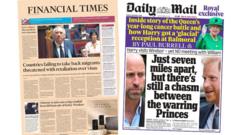Is Trump’s Chicago Takeover a Trap for Liberals?

Published: 2025-09-08 08:02:03 | Category: Trump GNEWS Search
On 2 September, President Donald Trump announced the deployment of federal law enforcement and the National Guard to Chicago, aiming to tackle escalating crime rates. This move has elicited a strong reaction from Democratic leaders, who fear it signals a drift towards authoritarianism. However, critics argue that Trump's interventions are more about optics than effective governance, suggesting that Democrats should view these actions through a more measured lens.
Last updated: 02 September 2023 (BST)
Key Takeaways
- Trump's deployment of federal resources is seen as a political strategy rather than a substantive crime-fighting measure.
- Democratic responses may inadvertently play into Trump's narrative, heightening political tensions.
- Legal challenges have arisen regarding the legality of Trump's actions in various cities.
- Federal intervention does not address the underlying causes of crime in urban areas.
- Temporary increases in law enforcement presence do not offer long-term solutions.
Understanding the Context of Trump's Interventions
President Trump has used federal resources in several major cities, including Los Angeles and Washington, D.C., under the pretext of restoring order amid protests and rising crime. These interventions have ignited a fierce debate about their legality and efficacy. Critics, particularly from the Democratic side, warn of potential authoritarianism, while others see the actions as largely ineffective and symbolic.
The Democratic Response: Panic or Justified Concern?
The immediate reaction from Democratic leaders has been one of alarm, with accusations of authoritarianism and fears of a federal takeover of local law enforcement. While such concerns are serious, they may overlook the reality of Trump’s intentions. Critics argue that Trump is deliberately provoking a reaction to galvanise his base and distract from more pressing issues.
What’s New vs. What’s Known
Trump’s actions are not unprecedented; previous administrations have deployed federal resources in times of crisis. However, the current political climate is charged, and the optics of such moves are under intense scrutiny. Democrats have often responded with outrage, but this reaction may play into Trump’s strategy of portraying himself as a law-and-order candidate.
Assessing the Effectiveness of Federal Intervention
Despite the alarm, Trump’s interventions have not resulted in the draconian scenarios that critics fear. For example, in Los Angeles, a federal judge ruled some actions illegal, yet the majority of federal troops remain in place, primarily performing non-enforcement tasks. This raises questions about the actual impact of such deployments on crime rates.
Temporary Solutions vs. Permanent Changes
While an increased federal presence may lead to a short-term dip in crime statistics, it does not provide a sustainable solution. Crime in urban areas is often rooted in complex social issues, including poverty, lack of access to education, and systemic inequality. Simply sending in the National Guard does not address these foundational problems.
The Illusion of Control
Trump’s strategy appears to be more about controlling the narrative than genuinely addressing crime. By framing his federal interventions as necessary, he positions himself as a decisive leader amidst chaos. However, the reality is that these actions often result in minimal changes on the ground, as seen in recent deployments.
Legal and Ethical Considerations
Legal challenges to Trump's actions have surfaced, highlighting concerns about the legality of federal intervention in local law enforcement. While some argue that these measures are justified under federal authority, others caution against setting a precedent that could lead to overreach. The implications of such legal battles could resonate well beyond this administration.
The Role of Local Leadership
Local leaders have voiced concerns about the effectiveness of federal intervention, arguing that it undermines their authority and disrupts community-based policing efforts. Many believe that sustainable solutions must come from within the communities themselves rather than from federal mandates.
Conclusion: A Call for Measured Responses
In summary, while President Trump's deployment of federal resources to combat crime is a significant political move, the reactions from Democratic leaders may be overblown. It is essential to treat these actions as part of a broader political strategy rather than an immediate threat to democracy. A balanced approach that addresses the root causes of crime, rather than merely reacting to political provocations, may serve both parties better in the long run. Could a more collaborative effort between federal and local authorities lead to real change? #PoliticalStrategy #FederalIntervention #CrimePolicy
FAQs
What prompted Trump's deployment of federal resources to Chicago?
Trump announced these deployments to combat rising crime rates in urban areas, aiming to showcase a strong law-and-order stance.
How have Democrats responded to Trump's actions?
Democratic leaders have expressed concerns about authoritarianism, fearing that federal intervention undermines local governance and civil liberties.
Are Trump's interventions legal?
There have been legal challenges to some of Trump's actions, with a federal judge ruling certain deployments illegal, yet allowing some federal troops to remain in place.
What are the long-term implications of federal intervention in local law enforcement?
Federal interventions may provide temporary relief but do not address the root causes of crime, which require comprehensive community-based solutions.
How do local leaders view federal intervention?
Many local leaders believe that federal intervention undermines their authority and disrupts efforts to implement effective community policing strategies.



